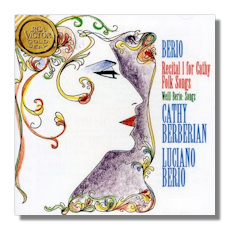
The Internet's Premier Classical Music Source
Related Links
-
Berio Reviews
Weill Reviews - Latest Reviews
- More Reviews
-
By Composer
-
Collections
DVD & Blu-ray
Books
Concert Reviews
Articles/Interviews
Software
Audio
Search Amazon
Recommended Links
Site News
 CD Review
CD Review
Recitals for Cathy

- Luciano Berio:
- Recital I for Cathy *
- Folk Songs
- Kurt Weill:
- Song of Sexual Slavery
- Le grand Lustucro
- Surabaya Johnny
Cathy Berberian, mezzo
Juilliard Ensemble/Luciano Berio
* London Sinfonietta/Luciano Berio
RCA 09026-62540 2 64:35
Summary for the Busy Executive: Super-Cathy.
Cathy Berberian rose to eminence as one of the greatest exponents of tough, contemporary music. Everybody wanted to write for her. She took part in several Stravinsky recording premières under the supervision of Stravinsky himself. However, people associated her most closely with Luciano Berio, her husband until 1966, who continued to write for her after their split. Calling her a diva of the avant-garde always struck me as unfair. She had both the musical intelligence and solid vocal technique to sing advanced work superbly, but, really, she could sing just about anything. She shone in early music, Lieder, Rossini, and could also do convincing pop – in short, a super-singer.
Berio takes up the bulk of the disc. Recital I for Cathy (1971) typifies his "collage" technique. Recital includes a Monteverdi aria, more or less straight, a mock-Baroque aria Berio had written in the Forties, various phrases from Mahler, Schubert, Verdi, Prokofieff, Purcell, Schoenberg, and others, all set against a swirly, scintillating background. Berio requires his ex to turn from one to another after as few as three notes. This sort of thing could easily become pointless, but Berio provides a dramatic situation. A mezzo rehearsing for a recital waits for her accompanist to show up and becomes unhinged, skittering from one item in her repertoire to another. The work becomes a modern equivalent of the operatic "mad scene," a toothsome duck soup to Berberian. She certainly knows how to act while she sings, although less so when she speaks or sprechstimms – that is, speaks on approximate pitches in a specified rhythm. Consequently, the work succeeds best when Berio gives her actual pitches. For me, however, the main attraction is Berberian, rather than the work, which strikes me as too easy. It's Berberian who gives it class.
Folk Songs, from 1964, yet another collage, this time mixes settings written over roughly two decades together in one work. Purists will find the work misnamed. It includes folk tunes, fake folk, and pop – 11 in all – from the United States, France, Italy, Sicily, Sardinia, Armenia, and Azerbaijan. To me one of the most beautiful vocal works of the post-war era, Folk Songs uses a chamber instrumentation of flute, clarinet, harp, viola, cello, and percussion. It begins with a fiddler "playing himself in" as the singer begins "Black is the color of my true love's hair" and moves into "I wonder as I wander," both by John Jacob Niles. Simple though these tunes may be, they are artfully simple. Berberian brilliantly catches their flavor by turning herself into a concert version of "mountain soprano" Jean Ritchie, thinning out the tonal heft while remaining sweet and true. As in Recital I, largely traditional settings are put into avant-garde environments. Yet, the tunes keep their vernacular character. The Italian set (including Sicily and Sardinia) surprised me the most, since most of them sound Falla-Spanish to me. The Sardinian "Motettu de tristaru" and the French "La fiolairé" (from Canteloube's Chants d'Auvergne) receive the most extreme treatment. Berio, to his credit, throws the spotlight on the basic material, rather than on his contributions per se. Nevertheless, it remains, in its post-modern eclecticism, a resolutely contemporary, even prophetic work. Throughout, Berberian virtuosically changes her vocal colors to suit the music and the text. In the French "Rossignolet du bois," she becomes a young girl on the edge of first love. In the Italian "A la feminisca," she becomes possessed by Spanish duende. In a second song from Canteloube, where Berio essentially translates Canteloube's orchestra to chamber proportions, "Malurous qu'o uno fenno" (roughly, "Women! Ya can't live with 'em, ya can't live without 'em"), Berberian manages to dance through sass, cynicism, and merriment. One of the finest performances by a singer who routinely turned out great ones.
The disc ends with three songs by Kurt Weill, two of them classics: "Ballad von der sexuellen Hörigkeit" (ballad of sexual dependency) from Die Dreigroschenoper, "Le grand Lustucru" (Lustucru the Great) from Marie Galante, and "Surabaya Johnny" from Happy End. Berio, for some reason, orchestrated these. After all, Weill, a master of instrumental color, orchestrated them himself. Berio differs from Weill, essentially offering up more wholesome timbres than the originals. I prefer Weill's sourer sound, reeking of spilled whiskey, urinal cakes, and stale cigarettes. Berberian sings both German items in English, translating them herself. She provides credible lyrics. I prefer Blitzstein's version of the "Ballad," but at least Berberian avoids the trap academic translators fall into, essentially so concerned with literal meaning that they forget Brecht's zip and wit. Again, these tracks' reason for being comes down to Berberian's performance. She has carved out her own niche with these songs, apart from Lotte Lenya, Gisela May, and the lesser Ute Lemper. For one thing, she sings them without the throaty rasp. However, what puts her in the exalted company of Lenya and May is once again the fact that she is such a splendid singing actress.
Dawn Upshaw's recording of Folk Songs (see my review) is a fine job, but Berberian makes her seem bland. As I say, if you don't know Berberian's work, you can start here.
Copyright © 2009, Steve Schwartz




















